International Symposium on Tourism Branding
- Tourism
Necessity of National Branding that Includes World Trends and Tourism
∼Considering "Legacy" with a Focus on Post- Tokyo 2020 Olympic and Paralympic Games∼
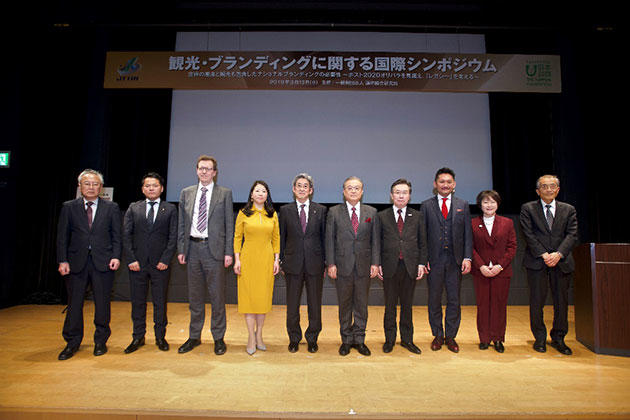

| Organizer | Japan Transport and Tourist Research Institute (JTTRI) |
|---|---|
| Date / Time | Wed, Mar 13,2019 13:30~17:30 |
| Venue | Marunouchi Hall & Conference |
| Theme | Necessity of National Branding that Includes World Trends and Tourism ∼Considering "Legacy" with a Focus on Post- Tokyo 2020 Olympic and Paralympic Games∼ |
Event Summary
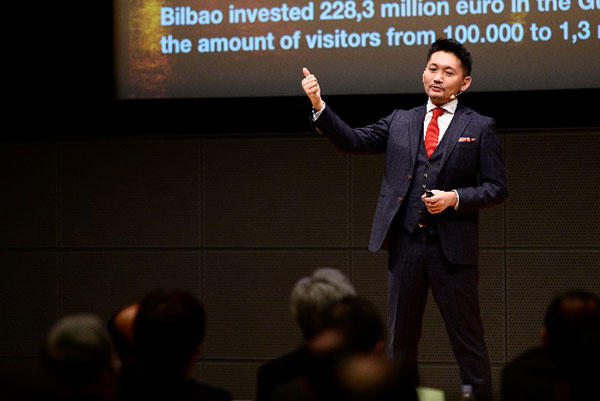
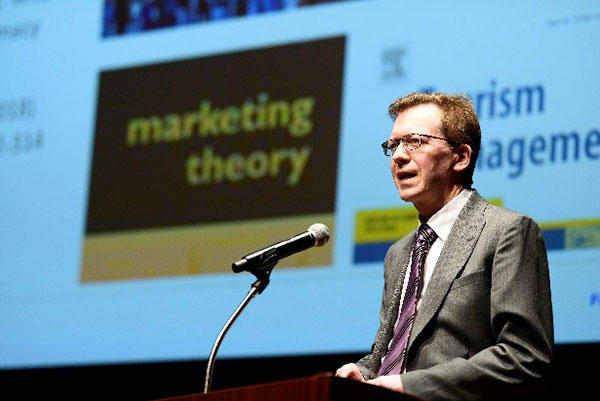
The Tokyo 2020 Olympic and Paralympic Games, and Expo 2025 Osaka, Kansai are planned, and while the world is drawing attention to Japan, This is a great opportunity to establish Japan as a brand. For example, in the UK, under “the Great Campaign” that started in 2012 with London's Olympic and Paralympic Games, overseas British government agencies and the British Chamber of Commerce collaborated, and even now, various efforts are being made to maximize the opportunities for tourism and business in the UK in a unified manner throughout the world. In Japan as well, in order to contribute not only to attracting tourists but also to sympathizing with Japan’s “culture” and “tradition” and further promoting “export”, “investment in Japan”, “increase of the number of international students”, it is necessary to show Japan’s attraction to the world with all our strength and to connect it to the next generation as a “legacy” of post-the Tokyo 2020 Olympic and Paralympic Games. In addition, as the number of foreign tourists visiting Japan has risen to 40 million, the rapid increase in the number of foreign tourists visiting Japan has had a great impact on Japan's social and economic conditions. Because of this, not only the number of foreign tourists visiting Japan and the amount of consumption, but also the perspective that international tourism has a fundamental and essentially multifaceted function is essential. As one of them, public diplomacy (public relations and cultural diplomacy) is becoming more and more important as the world situation in Japan today becomes more complicated and uncertain. Based on this awareness of issues, the keynote speeches were given on the latest trends in the world, success factors, and the philosophy behind them, under the theme of "Place Branding", which was an indispensable and important element not only in tourism but also in a wide range of fields and in both public and private sectors. Dr. Dinnie, University of Dundee School of Business, introduced the national branding philosophy and case studies from around the world, Mr. Namiki, President & CEO of Interbrand Japan, Inc., introduced the principles of branding, in addition, Ms. Matsuda Healy, the New York City Tourism Bureau introduced world-class DMO (Destination Management / Marketing Organization) know-how, and Mr. Sano, a former British Embassy in Japan, introduced the "Legacy" of London Olympic and Paralympic Games.
In the latter half of the panel discussion, there were lively discussions and recommendations on the significance of "place branding" including national and regional levels, the state of world-class DMO, the need for a unified response and structure across public-private partnerships and government organizations, fostering consciousness involving the residents as "City Pride" and "Civic Pride", relationship between national branding and tourism field, concept and practical use of KPI (Key Performance Indicators) in advanced foreign countries, and actions toward the post-2020 “legacy”,
On the day of the symposium, Mr. Tabata, Commissioner of the Japan Tourism Agency (JTA), and Mr. Miyagawa, Director-General for Cultural Affairs, Ministry of Foreign Affairs of Japan, gave honorable Guest Remarks, and it was a successful symposium with approximately 280 participants from Japan Tourism Agency, Japan National Tourism Organization, tourism related organizations, foreign embassies in Tokyo / tourism bureau of each countries, universities / tourism society organizations, local governments, and media.
- Please refer to the attached PDF for a summary of each keynote speaker.(https://prtimes.jp/a/?f=d43474-20190411-7615.pdf)
- • The key points of each keynote speaker are as follows.
【Dr. Dinnie, University of Dundee “National Branding and Its Necessity”】
- The concept of ‘Place Branding’ is basically the same for cities, regions, and countries. The difference is what kind of identity and who is involved in making decisions.
- In addition to tourism, attracting investment and attracting foreign workers and international students are also part of national branding. In many countries, national branding is vulnerable because it is a new field other than tourism.
- Recommendation for verification with "ICON model". (1) I “Integrated”: A consistent approach of public-private partnership. (2) C “Contextualized / Consider the context”: Fits the current market. (3) O “Organic”: means to appear naturally. Although it is possible to do national branding without predicting it, it is dangerous because it is unknown whether plus or minus is left to accidental situations. (4) N “Newness”: Interesting and interesting thing.
- The success factor of the UK "Great Campaign" is the obligation for the responsible person to report directly to the Prime Minister. Prime Minister Cameron started, but even after becoming Prime Minister May, it continued to be reported. All bureaucrats inevitably support it because top politicians support it.
- Japan needs to move beyond "Cool Japan". The meaning of "cool" is limited and the meaning of "cool" is limited and does not cover all that Japan can provide. For example, the expression "cool = smart" for Japanese food and drink is not suitable.
- In the Tokyo Olympic and Paralympic Games, it is necessary to manage the relationship between the city brand of Tokyo and the national brand of Japan. How the Tokyo brand influences the Japanese national brand. For other cities, it is necessary to consider the benefits of the Tokyo Olympic and Paralympic Games.
【 Mr. Namiki, President & CEO, Interbrand Japan, Inc. “Why is “Branding” now?”】
- A "brand" is a firm reputation established in people's minds through all points of contact and activities. As long as everyone can clearly think of the image, it is a brand. A brand is a constantly changing business asset
- Survey from the perspective of C (Company, Competitor, and Customer). As a result of the survey, “how to set promise from the customer's perspective” is the most important. Brand changes behavior. Speaking of countries, for example, if there is a clear image of the Japan brand, the behavior changes such as “Let's go to Japan” and “Let's invest Japan” will be brought about. However, unless it is clear what Japan promise, it ends up with an abstract image and will not lead to behavior changes.
- Even if we make a “promise”, we cannot realize the brand without “experience”. Promise is important, but how to make them feel that way to the recipients, as long as this cannot be realized, it will be a desk theory.
- There are already many realities in Japan, Tokyo, and other cities, so it's not a start from not being able to establish branding without focusing on creating reality. However, regarding how to create it as a brand and experience it, there is a room for growth in Japan (country) and each city.
- Regarding “Why Destination Branding is necessary”, for example, Destination Branding is necessary so that people can intuitively decide which country is better to move with children.
- In destination branding, the three elements required for branding a business (logo, actual experience (visiting the land), and area (map-based knowledge)) are not necessarily required. For example, everyone can imagine Silicon Valley, but there is no logo. The image of Las Vegas comes to mind even if everyone does not have a real experience (visit). Even though it is unknown where Galapagos is located, all the images come to mind. What everyone needs is a “symbolic story.”
- In Destination Branding, both “creating the reality” and “creating the reputation” are important. For example, in Bilbao, Spain, the brand was created by making the Guckenheim Museum a symbol. In Amsterdam, people wanted to change the reputation from the image of a coffee shop, so they created an iconic “I AMSTERDAM” signage and changed their reputation.
【Ms. Matsuda Healy, Tourism Market Development, NYC & Company “5 Practices to Make Your Brand Work”】
- Ms. Matsuda Healy introduced five things to make the brand work (① Partnership, ② Flexibility, ③ Community Involvement, ④ Take a Stand / Establish a position, ⑤ Be real / Realistic).
- ① Partnership: The New York City Tourism Bureau is a non-profit organization that is a membership-based organization of public-private partnerships. The annual budget is $ 39.5 million, half of it is from the city and there is no hotel accommodation tax. The remaining budget is membership fees, sponsor contributions, and program profits. As a successful program, a vibrancy program with members. Restaurant Week, Broadway Week, etc. were set during the off season, and members were offered special rates.
- ② Flexibility: It is important to flexibly change the DMO method according to changes in the market. By matching the good points of the public and private sectors, it is possible to adjust the situation more quickly. For example, full-time staff and outsourcing should both be considered when investing.
- ③ Community Involvement: There are two perspectives: "development of communities" and "quality of life (QOL)". The important thing is to tell the residents there things. The significance of communicating the development and value of the community is to secure sufficient government funds for a long period of time and to promote public understanding of tourism issues. If each citizen can benefit from tourism, the number of collaborators will increase.
- ④ Take a Stand / Establish a clear position: Brands now represent an important international issue. The message "NY always welcomes you" is sent to the world to inform the world that the United States cannot change NY even if it takes protectionism. Consumers today are interested in brand values and principles.
- ⑤ Be real / Be realistic: If you send something, you need to take action. Send consistent messages at the points of contact where the brand touches someone to win the trust of consumers. NY hosted the World Pride first and many LGBT participated. NY always works on an innovative approach, consistently sending out new reborn every day.
【Mr. Sano, Former Marketing Manager, the British Embassy Tokyo “Public Diplomacy and the British Government GREAT Campaign”】
- While the U.S. has a strong ideology, such as security, the UK began strengthening public diplomacy due to motives for commerce, tourism, and cultural promotion, and in the mid-1990s made "Cool Britannia" a national brand strategy. And it had been transformed into the image from "conservative and class society" of the 90’s to "innovative and dynamic country" and "innovative ideas full of creativity, a nation as a cultural hub." The purpose of "Cool Britannia" was a domestic message that Britain changed itself from the negative image of the Thatcher era to become a cool nation.
- In fact, it was a long way from "Cool Britannia" to "Great Campaign". From the 2010 coalition government, public diplomacy changed the terminology to soft power, and the way of diplomatic communication so far was reformed. In 2011, "Soft Power" was defined as a tool of British foreign policy.
- As an external environment since 2010, there were lots of international events such as the 2010 Pope's visit to UK, 2011's Royal Wedding, 2012's 60th anniversary of Queen's reign,2012, London Olympic and Paralympic Games, 2015’s Rugby World Cup, etc. The "Great Campaign" aimed at a sustainable effect as a campaign that sought results by focusing on trade, tourism, investment, and study abroad with a low budget, while utilizing international events that attracted attention from the world.
- During the period, the British Embassy and the British government agencies organized a unified promotion as a thread that connected international events that attracted a lot of attention but tended to be transient. The most important point was the cross-ministerial brand. From the 2010 coalition, austerity measures were implemented. Under the "Great Campaign," the theme was cross-sectional introduction of assets such as business, tourism, culture, and education across businesses through public institutions such as Foreign and Commonwealth Office (Embassies & Consulates), Department for International Trade, VisitBritain and British Council, etc. For this reason, it was always necessary to contact and adjust between overseas British government agencies.
- Austerity is the key to the KPI of the "Great Campaign." For example, VisitBritain had a budget cut of 30% in 2010 and compensated for the decrease with the “Great Campaign” budget. Therefore, the existing activities could not be maintained. As a matter of fact, the person in charge was forced to think about how to develop it in the context of the Great Campaign in daily activities.
- The "Great Campaign" is a campaign for realizing economic growth policies such as trade, investment, and tourism, not re-branding because the UK already has a strong national brand. In the "Great Campaign", the theme is to set a cross, and pillars of the campaign can be used in any industry.
- The success factor of the campaign was that Former Director of Communications, Foreign and Commonwealth Office was in charge of all ministries and agencies as the supervisor. The reason why the UK is a stable national brand is that it has gradually improved its public diplomacy policy and adapted it to the times.
Program of the seminar is as the following
| Opening Remarks (13:30~13:35) |
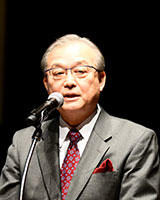
Masafumi Shukuri
|
|---|---|
| Honorable Guest Remarks(13:35~13:45) |

Hiroshi Tabata |
| Honorable Guest Remarks |
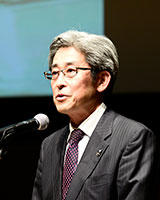
Manabu Miyagawa |
| Keynote Speech 1 (13:45~14:15) | |
| Keynote Speech 2 (14:15~14:45) | |
| Keynote Speech 3 (14:45~15:15) | |
| Panel Discussion(15:35~17:15) Moderator |

Kyoko Kanehira |
| Short Speech | |
| Panelists |
Keith Dinnie |
Outline of the seminar
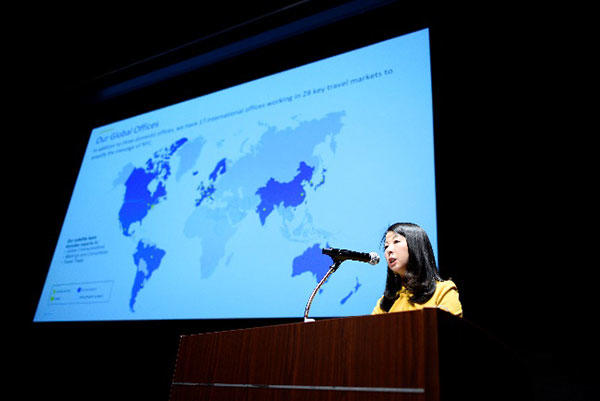
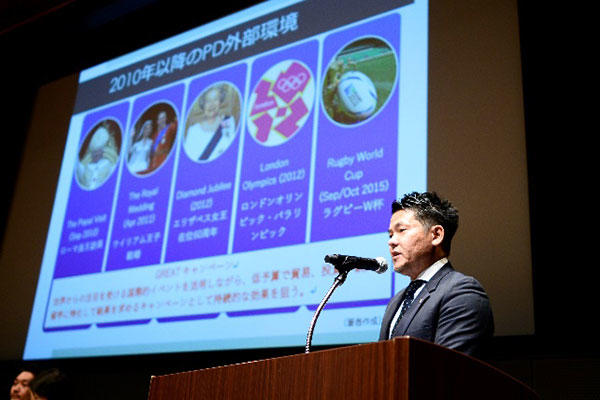
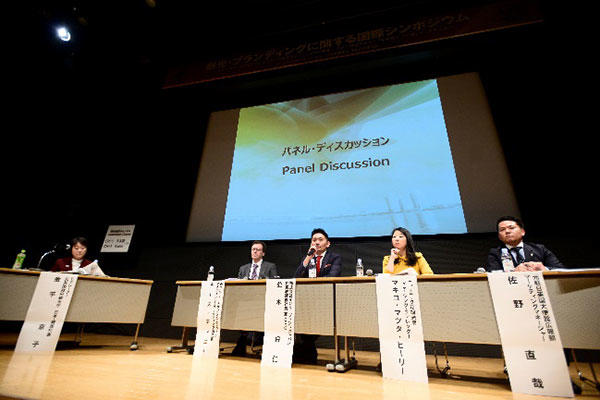
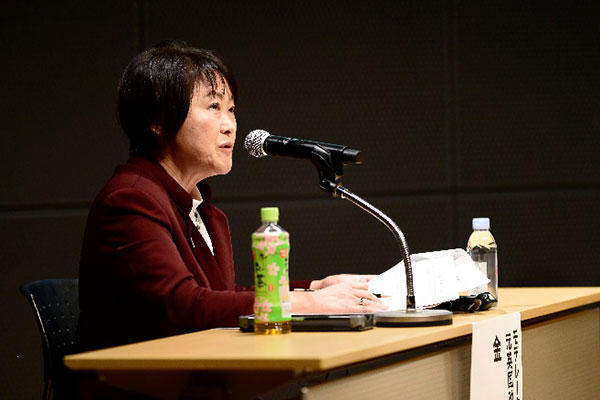
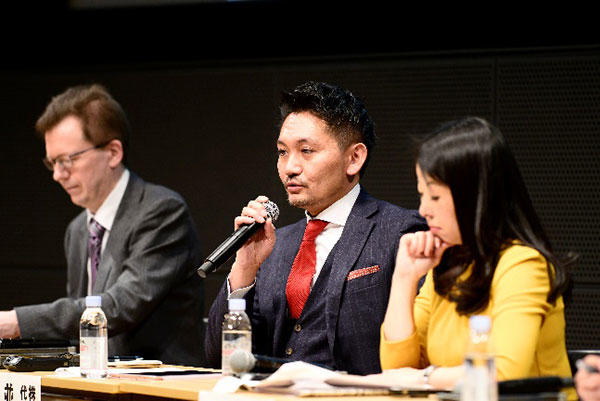
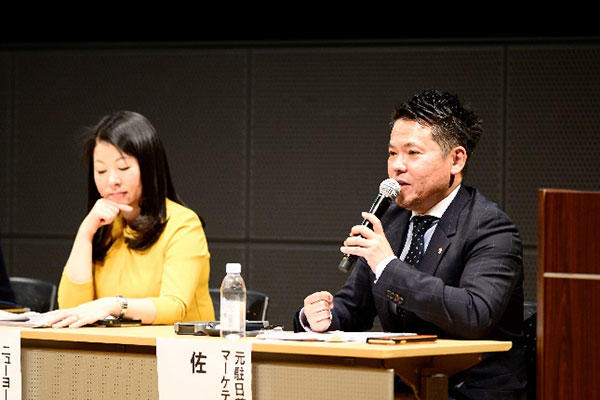
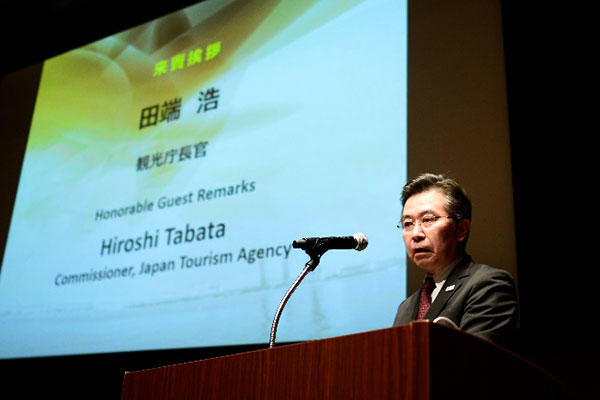
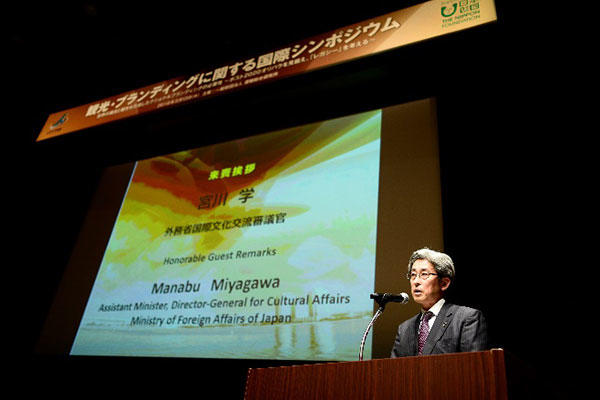




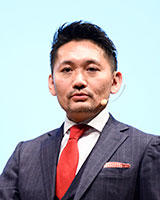
 Makiko Matsuda Healy
Makiko Matsuda Healy 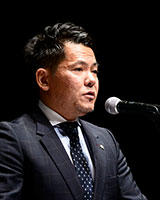 Naoya Sano
Naoya Sano